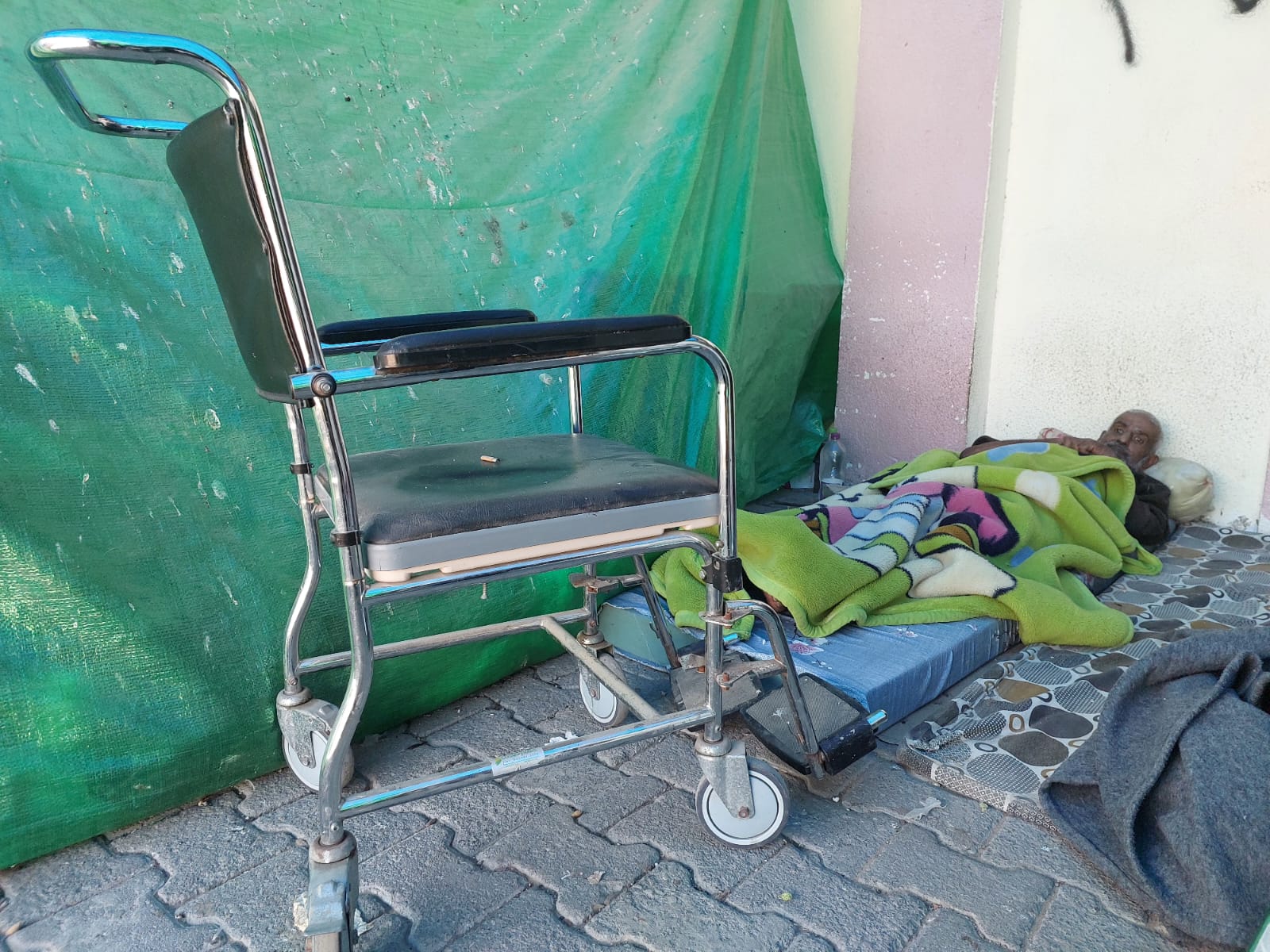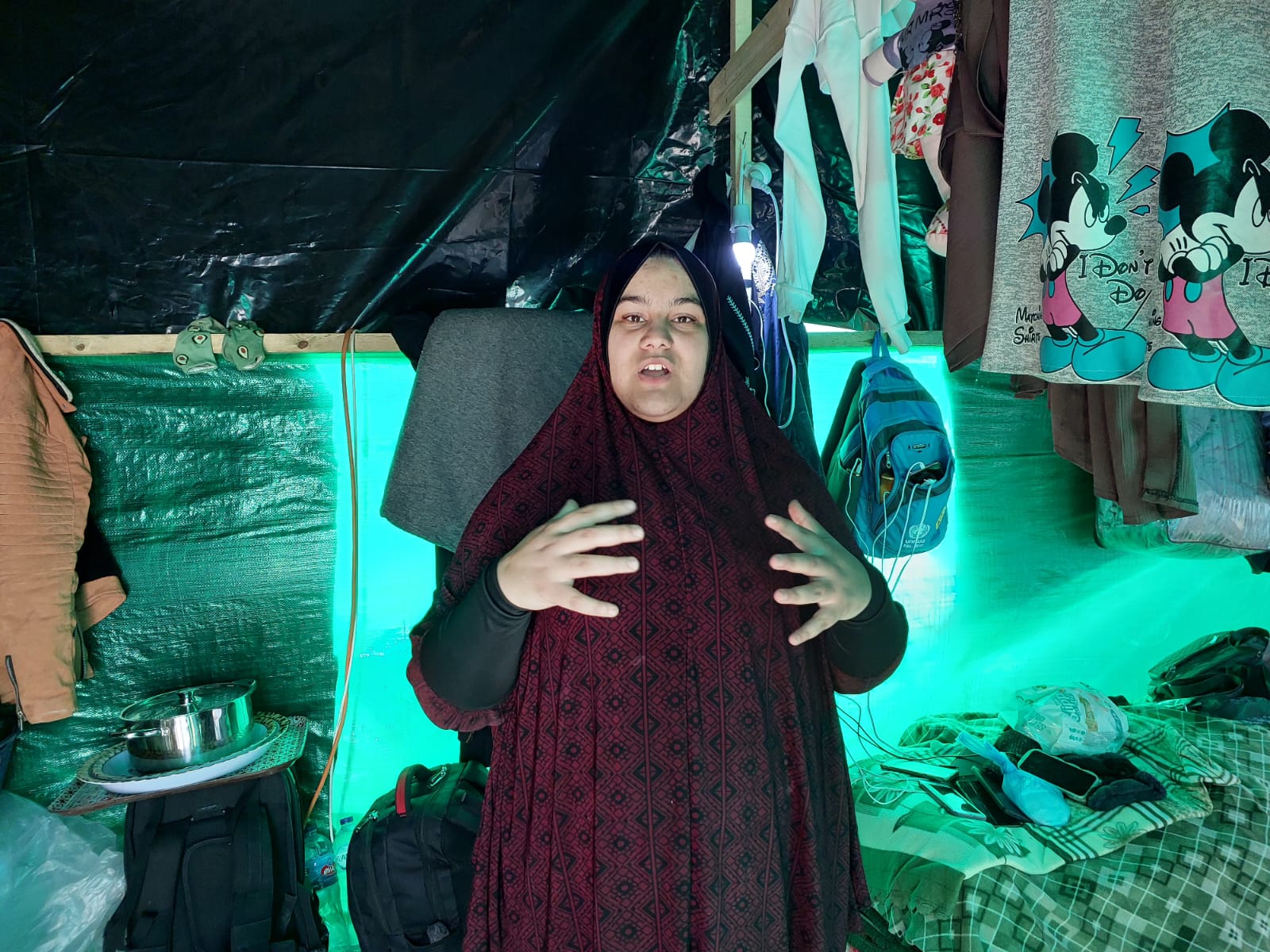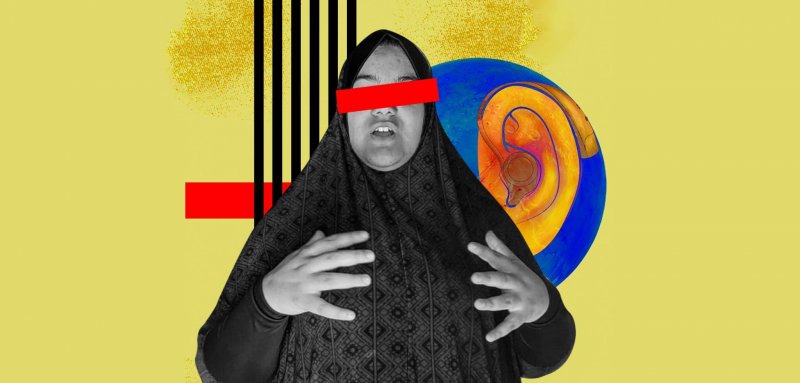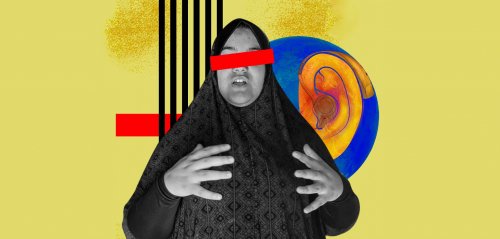“I am not okay. I just want the war to end and to live in peace. I stopped using my hearing aid; I don't want to hear the sound of bombing. It disturbs me and terrifies me,” this is how Afnan Aldahdouh, 20, whose hearing is impaired, describes her days in war-torn Gaza. She tries to escape the incessant sound of rockets and shells, and seek a safe and silent space.
Afnan has suffered in dire living conditions since the start of the war, especially after she was displaced to a tent outside the Al-Aqsa Martyrs Hospital in central Gaza. Israeli bombardment forced her to move from the Tel Al-Hawa area towards the south of Gaza. The overcrowding, and large number of people crammed into one area, caused Afnan to feel suffocated and agitated.
“What terrifies me most is if the house collapses on top of us. How will I hear what's going on around me? Will I be able to scream for help? Or what if my brother is trapped beneath the rubble, screaming for help, and I am nearby but unable to hear him?"
Sitting beside her sister, a sign language teacher who translates her words, Afnan tells Raseef22 of her experience of the war in the absence of hearing, “I got tired of searching for ways to charge my hearing aid, so I gave up on using it. This seemed like a good idea, so that I don't hear the sounds of explosions. But I don’t need anybody to tell me when there is nearby bombing or shelling– I feel the ground shaking beneath me, I see fires and trails of rockets, and I feel their heat through the window in front of me.”
Despite being unable to hear what is happening around her, Afnan lives in a state of constant terror, as she watches her neighbors run, and sees the fear of death in their eyes. She copes through conversations with her family, where she asks them whether the bombing is near or far from their home. Sometimes, she follows the news on her mobile phone, via outlets that provide sign language interpretations.
Living nightmares
Afnan's mind is filled with scenarios of what might happen to her in the war, without her sense of hearing. She confesses, “What terrifies me most is if the house collapses without me hearing, and I find myself buried beneath the rubble, with nobody aware that I’m there. Sometimes I wonder, what if I don't die under the rubble, what if I stay alive? How will I hear what is going on around me? Will I be able to scream for help? Or what if I survive, while one of my brothers is trapped beneath the rubble, screaming for help, and I am unable to hear him. These thoughts cause me great pain, because I see that death and destruction leave nobody behind. The smell of death engulfs the entire Strip, there is no peace or safety."
Israel’s attacks have disproportionately affected Gazans with disabilities, according to a report by Human Rights Watch. They are also less able to escape the bombing or access “desperately needed necessities and humanitarian aid.”
According to the report, “the grave risks all civilians in Gaza face from the Israeli military operations are multiplied for people with disabilities.” The Israeli army's evacuation orders did not consider the needs of people with disabilities, many of whom are unable to move, “find shelter, and obtain water, food, medicine, and assistive devices they desperately need.”
In 2020, the human rights organization documented the effects of the inadequate infrastructure in Gaza that enables “people with disabilities to enjoy their human rights on an equal basis with others.” The current destruction has “exacerbated the already dire situation.”
“I got tired of searching for ways to charge my hearing aid, so I gave up on it. This seemed like a good idea, so that I don't hear the sounds of explosions. But I don’t need anybody to tell me when there is nearby bombing or shelling – I feel the ground shaking beneath me, I see fires and trails of rockets, and I feel their heat through the window in front of me.”
"Crawled down the stairs"
In one courtyard filled with tents for the displaced, an elderly man has taken refuge. Ahmad Al-Masdar, who suffers from a mobility impairment, lies on the ground and covers his cold body. Next to him is his wheelchair, which is no longer fit for use. The Israeli attacks forced him to leave his home and move to a displacement camp in central Gaza.
The elderly man lives alone, since all his relatives live abroad. With no one to support or aid him, his suffering is greater. Al-Masdar tells Raseef22 about his escape, “On October 15, the bombing began to intensify near my house. I will never forget that day because the bombing was absolutely crazy. Despite that, I was adamant about not leaving my house, because I cannot move. I watched all my neighbors fleeing and screaming in horror. Some left their families under the rubble, while others made it out with their families.”
 People with disabilities speak of their hardships and experiences in war-torn Gaza
People with disabilities speak of their hardships and experiences in war-torn Gaza
He recounts, his face filled with horror, “I started crying and screaming from the window of my house, calling out to my neighbors and the people on the street fleeing for their lives: ‘For God's sake, someone help me! I can't move!’ But the bombing was so intense that nobody could hear me. I threw the wheelchair out of the window on the first floor, then crawled down the stairs until I made it outside.”
He continues, “One of the young men fleeing saw me, turned around to pick me up and placed me on the wheelchair. I kept telling him, ‘I beg you, my son, take me with you wherever you go. I have no one.’ So, he took me with his family to the displacement camp in the middle of the Strip.” Roads were destroyed and covered in rubble, which made navigating the wheelchair impossible.
Al-Masdar is desperate, “I wish I died before coming here.” He cannot move, even using his wheelchair, and is therefore unable to go to the bathroom on his own. He resorts to using diapers that his nephew or those in the camp with him help change.
“I started crying and screaming from the window of my house, waving my arms and calling out to my neighbors and the people fleeing for their lives: ‘For God's sake, someone help me! I can't move!’ But the bombing was so intense that nobody could hear me"
"The war is very harsh on us"
The occupation planes do not discriminate; they burn and target anything and anyone, without exception. Reem Jumaa, who is visually impaired, faces psychological warfare in addition to the conflict on the ground and all around. She lives in a constant state of anxiety and tension.
Reem is still at her home in Khan Younis in south Gaza. However, she is unable to sleep or undertake any domestic activities. Every time she hears bombing, she begins to shake, her joints stiffen in place, and she is unable to move. She is in a state of constant struggle and paralysis, so how will she escape when the occupation demands she evacuate her home? Where will she go?
 People with disabilities speak of their hardships and experiences in war-torn Gaza
People with disabilities speak of their hardships and experiences in war-torn Gaza
Reem relies on a cane to help navigate her surroundings, which has allowed her to memorize the layouts of her home and her neighborhood. She is concerned as to how she would cope if displaced to an area where her mobility is compromised, especially if she is forced to flee through destroyed streets. She questions how she will manage once she reaches an area of temporary refuge, such as a school, hospital, or a relatives' home, all of which will lack the appropriate facilities and accessibility for people with disability.
"I threw the wheelchair out of the window on the first floor, then crawled down the stairs until I made it outside. But I couldn't get up. One of the young men fleeing saw me screaming for help, and came back to pick me up and put me on the wheelchair. I kept telling him, ‘I beg you, my son, take me with you wherever you go. I have no one.’ The roads were destroyed and covered in rubble, which made navigating the wheelchair impossible
She tells Raseef22, “War is extremely harsh on people with disabilities, especially the elderly. The roads and public places are hard enough to navigate during times of peace, let alone during wartime. The bombings have left nothing behind, which makes the idea of leaving my house extremely challenging. I hope the war ends completely, and we are able to return to our normal and peaceful lives.”
Amna Kamel, a rehabilitation specialist for persons with disabilities, tells Raseef22 that the conditions in Gaza for disabled people are complex. “Some have been displaced to crowded hospitals, displacement schools, and camps, and face great difficulty moving around. They might encounter misunderstandings and awkward situations, like standing in restroom queues or getting food, especially in schools.”
In Gaza, roads and public places are hard enough to navigate during times of peace, let alone during wartime.
She points out that many disabled individuals have lost members of their families, and thus too their carers. Some have lost their treatment, and others have lost the necessary tools to help them move or hear. The number of people with disabilities in Gaza continuously increases, due to the recurrence of war. Kamel calls for the urgent provision of protective measures and accommodations for disabled civilians, in order to avoid discrimination. She underscores the need for immediate rehabilitation for people with disabilities, many of whom are suffering physically and mentally.
Raseef22 is a not for profit entity. Our focus is on quality journalism. Every contribution to the NasRaseef membership goes directly towards journalism production. We stand independent, not accepting corporate sponsorships, sponsored content or political funding.
Support our mission to keep Raseef22 available to all readers by clicking here!
Interested in writing with us? Check our pitch process here!






